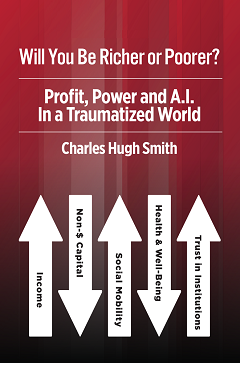Send this article to a friend:
August
21
2020

Send this article to a friend: August |
 |
Our Systemic Drift to Collapse
The boat ride down to the waterfall of systemic collapse is not dramatic, it's lazy drifting: a lazy complacency that doing more of what worked in the past will work again, and an equally lazy disregard for how far the system has drifted from the point when things actually worked. In my analysis, decoherencerefers to the loss of systemic coherence between narratives, values, processes and systems.Simply put, stuff no longer works and it no longer makes sense, but we've lost sight of this disconnect because the systemic drift has been so gradual that the memory of a time when things actually workedhas been eroded to the point of total loss. What remains is a limbic tropism to keep doing more of what's failed spectacularlybecause it once worked and therefore should work. In other words, our system has lost the ability to adapt to changing circumstances; the only menu of responses to a novel challenge is the same old menu of policies designed 50 or 75 years ago. Our system's policy response mirror's Hollywood's reliance on old franchises. Every comic book superhero has been mined to exhaustion, and Disney continues sinking deeper shafts to extract the last dregs of "value" from the 43-year old Star Wars franchise. Systemic drift has three dynamics:
It certainly wouldn't be the system we have now, but those benefiting from the current system will never allow any real change lest their feeding trough receive less slop. One common-sense set point is the number of hours of labor required to buy X: a car, groceries, a college education, a house, healthcare insurance, etc. As the chart below illustrates, by this set-point the vast majority of households have lost significant ground in the past 35 years. A second common-sense set point is the durability of everyday appliances and tools. I've often noted the collapse of durability in household appliances. Quality of goods and services is in decline across the board, with few exceptions. As my friend GFB has observed, the top 5% who design and market the garbage goods and services to the bottom 95% don't have to actually use the garbage goods and services they shove on everyone below them. Happily detached from the garbage they generate by their high wages and wealth, they plan their escape from the decoherence they've profited so mightily from pushing. A third common-sense set point is institutional competence and transparency. Major institutions simply don't function effectively or efficiently, and they are impervious to reforms or demands for improvement. The default is now poor service and sky-high prices, self-serving insiders, and obfuscation and denial rather than transparency. The system's narratives, values and processes no longer align. The grandiose claims that characterize our narratives do not manifest in the values and processes of our institutions. Rather than expose the system's profound decoherence, every effort is poured into changing the metrics to protect entrenched interests and promote a derealizing propaganda that not only is everything going great, ours is the best system in the known Universe. Thus do the lazy complacent passengers drift inexorably toward the cataracts of collapse just ahead. The noise of the falls is being masked by the chaotic din of oh-so-carefully edited social media and other screen-based media, and so the coming collapse remains "impossible" and "unexpected."
Recent Podcasts: AxisOfEasy Salon #17: Cognitive Conquest and Thinking the Unthinkable My COVID-19 Pandemic Posts Audiobook edition now available: Pathfinding our Destiny: Preventing the Final Fall of Our Democratic Republic ($6.95 (Kindle), $12 (print), $13.08 ( audiobook): Read the first section for free (PDF). The Adventures of the Consulting Philosopher: The Disappearance of Drake $1.29 (Kindle), $8.95 (print); read the first chapters for free (PDF) Money and Work Unchained $6.95 (Kindle), $15 (print) Read the first section for free (PDF).  (Kindle $6.95, print $12.95) (Kindle $6.95, print $12.95)
Will you be richer or poorer? What does the future hold for you--and for the world? Supposedly we're all getting richer, but many of us feel we’re becoming poorer. Why? This book tackles three critical questions: What if everything we don’t measure is worth more than financial wealth? Our obsession with financial capital is blinding us to a traumatizing global decline in other forms of wealth. Will artificial intelligence (A.I.) make us all richer? What if A.I. will only enrich the few who own the platforms and technology? Is our economic model dooming us? We’re told we all benefit as the super-rich get even richer, but what if the status quo only benefits those in power at the expense of everyone else--and our planet? Though we may not be politically powerful, we are far from powerless. This book will help you identify the things that truly matter, and accumulate capital that benefits you and your family--and our planet. Read the first section for free in PDF format. Will You Be Richer or Poorer?: Profit, Power and A.I. in a Traumatized World (15% discount in October, Kindle $5.95, print $10.95)
|
Send this article to a friend:
 |
 |
 |